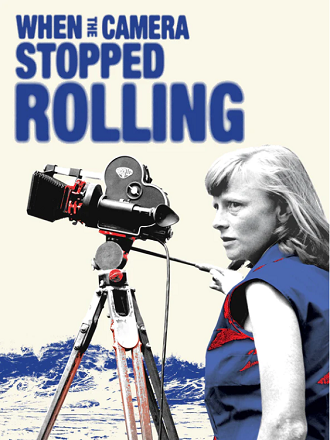
When the Camera Stopped Rolling 2021
Distributed by Collective Eye Films, 1315 SE 20th Ave. #3, Portland OR 97214; 971-236-2056
Produced by Pat Fiske and Jane Castle
Directed by Jane Castle
Streaming, 75 mins
College - General Adult
Environmentalism; Filmmaking; Women's Rights
Date Entered: 01/09/2024
Reviewed by Susannah Benedetti, Associate Director, University of North Carolina WilmingtonAn intimate portrait of mother-daughter Australian filmmakers Lilias Fraser and Jane Castle, When the Camera Stopped Rolling documents their careers, troubled relationship, work championing social justice, and the professional ground they broke. Directed by Castle, the film uncovers Fraser as a pioneer who “blasted through the glass ceiling of Australian cinema,” directing more than 40 documentaries from the late 1950s through the mid-1990s.
Castle presents her mother’s story using a trove of home movies, interviews and audio recordings, artifacts, correspondence, and arresting footage from many of Fraser’s films. Rich details bring her early professional struggles to life (identifying herself on her first film can simply as “L. Fraser” so that the processing lab would assume a male filmmaker and do a good job; being rebuffed by the Commonwealth Film Unit because as a woman they assumed she wouldn’t be able to physically lift the camera) and make her ambitious achievements all the more impressive.
The film digs into Fraser’s development as a filmmaker as well as a social justice advocate, capturing a complex era of nation-building in Australia. As her career blossomed, she increasingly chafed under the demands of pro-industry corporate sponsors eager to spotlight the country’s booming wave of mid-20th century industrialization and natural resource extraction, while her interest and sympathy lay with the people and communities damaged or destroyed in the process. She ultimately formed an independent company in order to make her own films, telling the stories of the affected and the marginalized. These included the seminal aboriginal land rights film This is Their Land (1970) and Women of the Iron Ore Frontier (1990), a study of isolation, unemployment, and racism in a remote mining town where sacred aboriginal areas were desecrated by the encroaching companies.
Literally growing up on both sides of the camera, Jane Castle touches on her childhood among film productions and crews, wanting to be close to her mother but stymied by Fraser’s struggles balancing life as a filmmaker with motherhood, alcoholism, a stormy marriage, and eternally shaky finances. Castle forged a high-profile career of her own as a cinematographer, working with Usher, Prince, and U2, as well as alongside Fraser, but this did not bring hoped-for connection between the women, and a deep-seated and unresolved emptiness led her to seek solace and purpose in environmental activism.
The film presents a powerful portrait of two supremely talented women who wanted to do more than make films for profit, but who could never completely connect with each other. The film weaves the professional and the personal into a tapestry reflective of the stressors underlying both parts of their lives. The strongest elements are the riches of content, the personal expression that gives the film its insightful foundation (Fraser jokes that she’s now known as “Jane Castle’s mother”), and the stunning cinematography and direction by Castle.
Clear-eyed and poignant but never sentimental, the film delves into complex and often messy truths about women’s lives and careers in a male-dominated world and the sacrifices involved in making it all work, resulting in an emotionally satisfying and even suspenseful mosaic portrait that is more powerful than a simple celebratory tribute would have been.
Awards:Winner Gold Award at the 2020 Spotlight Documentary Film Awards; Best Cinematography at the 2021 Women in Film Festival
Published and licensed under the Creative Commons Attribution 4.0 license. Anyone can use these reviews, so long as they comply with the terms of the license.